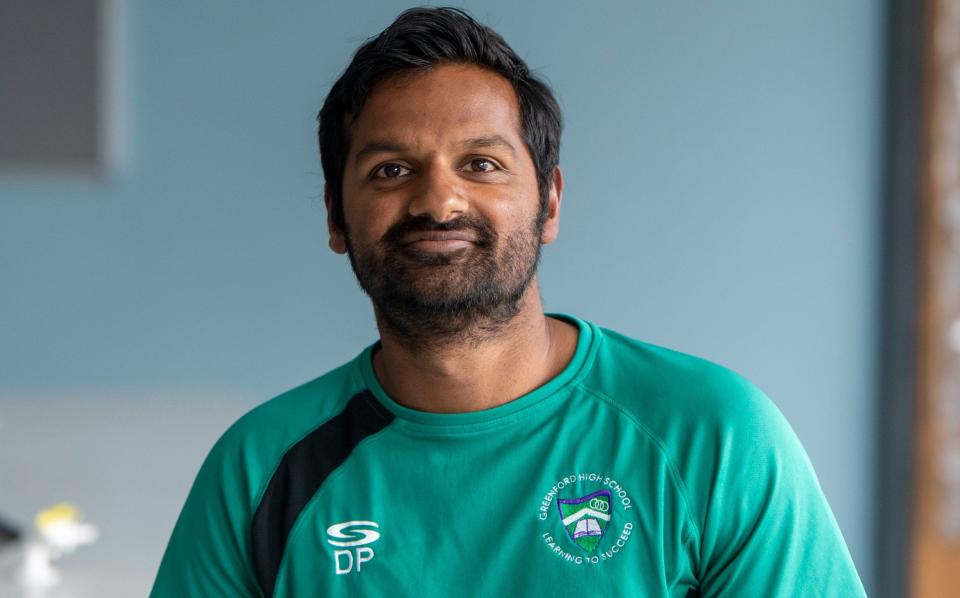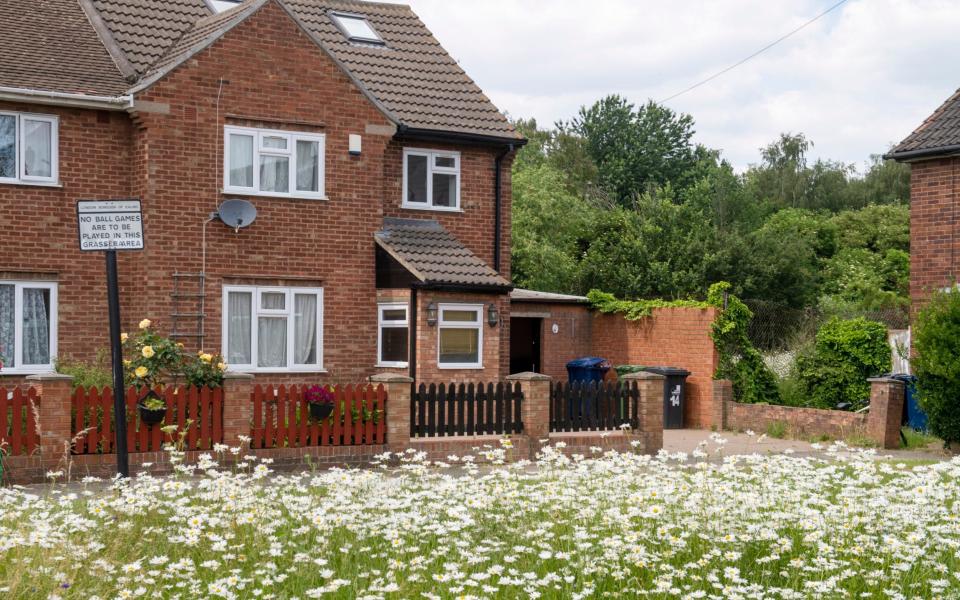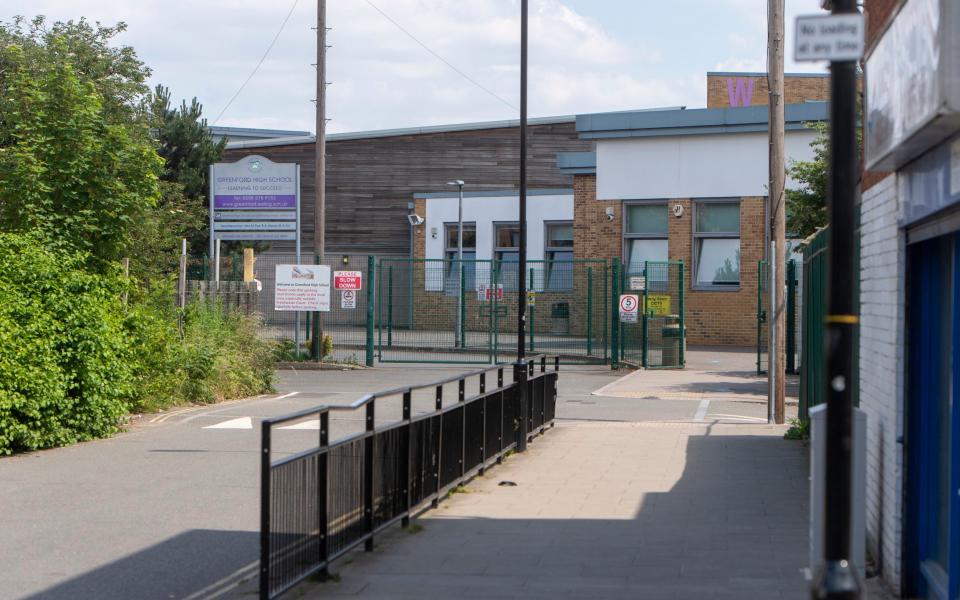Humble, hard-working, an A* pupil… how Bukayo Saka became a footballer we can all be proud of

His former PE teacher at Greenford High School remembers well the first time he watched a young 11-year-old called Bukayo Saka kick a ball.
“He had the full package of skill, was athletic and understood the rules of the game so well,” recalls Dipesh Patel, 35, who still works at the west London school, grinning at the memory of England’s boy wonder.
But there was another quality which immediately struck him about the young Saka. There were few of the unnecessary flicks and tricks prized by many lesser talents in the playground – this was a young man on a mission.
He became a household name in the 2020 Euros then broke down on the pitch at Wembley Stadium after missing a decisive penalty in the final against Italy.
Eighteen months later, it's clear that hasn't thrown him off course; he has been named Arsenal's player of the season and has scored three goals in the Qatar World Cup to help secure England a place in the quarter-final against France.
“His modesty meant that he was a team player,” Patel recalls. “He never wanted to be the centre of attention.”
These days, a signed football shirt belonging to the 21-year-old attacker occupies pride of place on the “achievement wall” in the corridor of Greenford High School (rated “Outstanding” by Ofsted), alongside a photograph of Saka smiling with his former teachers who helped him secure straight As and A stars at GCSE, even while rising through the ranks at Arsenal.

There is also a framed letter he has written to staff and pupils praising the school for its “constant support” and pledging: “I will always remember you.”
Another former PE teacher at the school, Mark Harvey, who remains in touch with the England international, describes Saka as a “shining example” for young people everywhere. A humble boy with a ferocious work ethic and eagerness to learn, who has made the most of his prodigious talent.
Certainly, Saka seems representative of a very new breed of England footballer. While, 25 years ago, England players celebrated scoring against Scotland in Euro 1996 by re-enacting the notorious “dentist’s chair” drinking game, which had marked their preparation for the tournament, Saka’s table in the England players’ lounge occupied by family and friends at the 2020 Euros was reported as being devoid of alcohol.
Unlike other football starlets who fill their social media feeds with sports cars and shopping splurges, the only nod to his reported £30,000-a-week Arsenal contract on his Instagram account are a couple of photos of him reclining on holiday: one on a boat with his brother and another with a can of Fanta. He still lives with his parents, albeit in a £2.3million home he bought last year in Hertfordshire, where he moved to be closer to the Arsenal training ground.
The handle of his account is “God’s Child”, reflecting his family’s strong Christian beliefs. His wider family, he says, prays for his success.
A neighbour in the wealthy enclave described the Sakas as “a delightful family” and the parents, father Yomi and mother Adenike, as “lovely, professional people”. Yomi takes particular pride in his perfectly-mown back lawn at the back of the six-bedroom mansion where Saka and his brother perform training drills.
Their home now is a far cry from the cramped red-brick semi in Ealing, west London, where Saka spent his childhood. Outside is a scrap of grassland which nowadays is marked by a sign warning “no ball games” but where, from the age of three, Saka would join his father (then a Newcastle United fan who idolised Alan Shearer) and brother for a kickabout most evenings, or on the concrete driveway. “As long as they were winning, I wouldn’t let them back inside,” Bukayo said in an interview last year, offering a telling insight into his own competitive spirit.
Their former neighbours recall the family as devout Christians and “a quiet family” who, during Lent, would display a cross on their car and attend church each Sunday.

In the relatively few interviews he has given in his nascent sporting career, Saka – who is nicknamed “little chilli” by his teammates for his ability to spice up attacks – has been careful to recognise the work of others in helping him flourish. Above all, his parents.
His mother and father both moved to England from Nigeria, working their way up through various jobs to give the young Bukayo and his older brother, Abayomi, the chance of a better life.
In contrast to his fellow England superstars Raheem Sterling and Marcus Rashford, who have spoken about their own turbulent childhoods, Saka’s upbringing was far more settled with a constant emphasis on hard work and education.
His mother is understood to currently work as an accountant, while both parents are previously listed as company directors for a property consultancy firm which folded several years ago. Even when money was tight, Saka recalls family holidays each year to far-flung destinations including Nigeria, the United States and Dubai.
Both brothers attended Edward Betham Primary School and then Greenford High School. Bukayo signed for Arsenal aged seven after previously playing for local club Greenford Celtic. His brother signed for Watford.

Saka has recalled how every weekend his mother would take his brother to training while his father would drive him across London to Arsenal’s Hale End academy. Often, he would do his homework in the back of the car.
“My mum and dad always encouraged me,” Saka said in an interview. “They never stopped me from playing football; they just wanted to see a balance and that I was also interested in my education.”
Like the vast majority of football apprentices, his older brother didn’t make the grade and was released by Watford at the age of 14, and currently studies at Watford University.
Bukayo, too, suffered his own challenges, in particular being hampered by a growth spurt that left him battling pain in his knees and heels. But, still, he rapidly progressed through the ranks while happily ignoring the growing buzz around him. Even as he started training with the Arsenal first team, he remained in close touch with his childhood friends with whom he would enjoy regular cinema trips.
Coaches from the Arsenal youth set-up right the way through to the England training camp praise his resilience, maturity and willingness to learn, as well as the blistering pace which allowed him to dance through the Czech Republic defence with such consummate ease.
Saka made his full home debut a few months after his 17th birthday against Qarabag in the Europa League. He had been told he was starting the previous day, and says his delighted family made sure he got an early night and were in the stands to cheer him on. He keeps the framed shirt from the match on a wall at home.

When he scored his first Arsenal goal, the first person he tried to speak with after the match was his father. He says his coaches were hurriedly trying to get him into an ice bath, so the grinning pair only had time to give each other a thumbs up over FaceTime instead.
Despite his unwavering support, Saka admits: “My dad will always tell me what I could have done better, even when I’ve played well.”
Such is his stellar rise, one wonders whether even Saka senior may soon run out of advice.

 Yahoo Sport
Yahoo Sport 





































